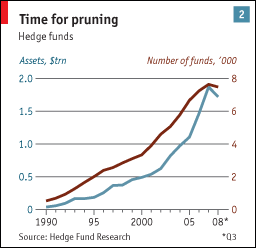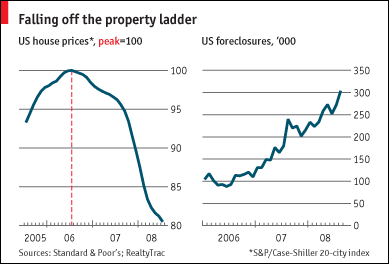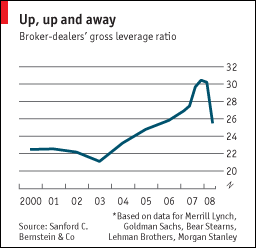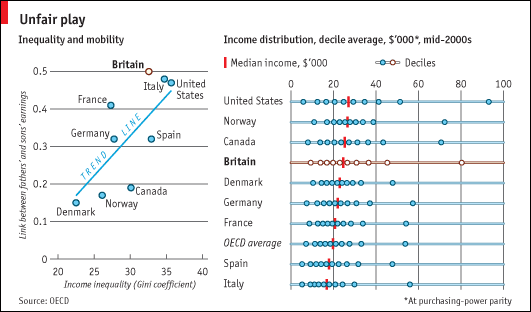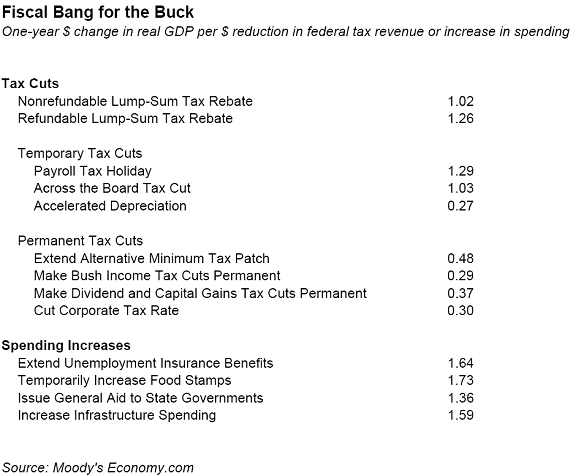|
current posts | more recent posts | earlier posts From the on line edition of today's New York Times:
Among the options, he said, the Fed can start aggressively buying up longer-term Treasury securities. That would have the effect of driving down longer-term interest rates. The Fed is already doing something of that sort, by buying up commercial debt from private companies as well as mortgage-backed securities guaranteed by Fannie Mae and Freddie Mac.
Investors reacted to Mr. Bernanke's remarks by pouring money into longer-term Treasury bonds, which briefly pushed already-low yields on 10-year and 30-year Treasuries to new record lows. Investors appeared to be reacting mainly to the clear signal from Mr. Bernanke that the Fed was preparing to pump money into the economy by buying up longer-term bonds.
If I, the all-powerful Federal Reserve, let you know that I will soon start purchasing asset X in order to decrease its yield (i.e. drive up its price, as X is a fixed coupon bond) what will you, the private investor, do? Well, if you are not completely drunk you will purchase asset X (Treasury bonds) today and finance it by selling asset Y (stocks) in order to capture the promised capital gains that my future purchases of asset X will create for you ... oops, by selling stocks today you are forcing their prices to drop? Life is tough, honey and we are here to make money, aren't we?
Apparently they call this kind of stuff "activist monetary policy". It is supposed to make all of us better off, and support stock market's prices. Oh yeah ...
[Posted at 12/01/2008 10:38 PM by Michele Boldrin on Against Monopoly  comments(0)] comments(0)] Recent headlines speak volumes about the hypocrisy of the state. On the one hand, we have state persecution of private firms for collusion, price-fixing, monopolization, etc., e.g. LG, Sharp plead guilty to LCD price-fixing, take $585m fine; antitrust actions against Microsoft, both in the US and Europe ( EU hits Microsoft with record 899 million euro antitrust fine); and as I noted in The Schizo Feds: Patent Monopolies and the FTC, the state grants patent monopolies and then uses antitrust law to attack the beneficiaries of those monopolies.
And on the other hand, we have state monopoly-granting patent office collusion: Blueprint Laid Out for Work-Sharing Among Five Intellectual Property Offices, reporting that "The United States Patent and Trademark Office (USPTO) announced the development of a blueprint for work sharing among five major intellectual property offices (IP5) to address the common challenges they are currently facing. The heads of the IP5 met at Jeju, Korea, on October 27 and 28, 2008, to discuss a shared vision for work sharing and collaboration."
And we have the G20 nations colluding ("US President George W. Bush said Thursday that world leaders will 'lay the foundation for reforms' at global economic crisis talks this week...."), not to mention "coordination" by the world's central banks (Fed, European Banks Coordinate Interest Rate Cut; Central Banks Coordinate Global Cut in Interest Rates; EU Leaders Vow to Coordinate Response to Finance Crisis).
Utter hypocrisy--and, as usual, exactly backwards: the state outlaws private "collusion" while engaging in global collusion itself, when, as Rothbard shows, only states are able to form genuine monopolies in the first place. (See Man, Economy, and State, ch. 10; also Hoppe, A Theory of Socialism and Capitalism, ch. 9.) [Posted at 11/13/2008 08:44 AM by Stephan Kinsella on Against Monopoly  comments(1)] comments(1)] [Posted at 10/29/2008 11:02 AM by John Bennett on Against Monopoly  comments(0)] comments(0)] For good or ill none of us have a monopoly on the truth. I don't remove or censor posts or comments except for some obvious spam. I realize that it often seems during a heated debate that whoever we are disagreeing with must be being deliberately obtuse not to understand our clear and obviously correct arguments. Anyone who know me knows I feel that way. And of course it is natural if we feel we are being called names to respond in kind. But can I ask posters to try to dial back the personal rhetoric? I think things are escalating to the point that we are scaring readers more than appealing to them. The more rational side of me also argues that neither side is likely to win converts to their point of view by calling people names. [Posted at 10/26/2008 09:02 AM by David K. Levine on Against Monopoly  comments(12)] comments(12)] I've been spending a lot of time the last few weeks learning about this financial crisis and financial crises more generally. I've heard Rolf Luders from Chile talk about how they solved their financial crisis; and I've heard Takatoshi Ito from Tokyo University explain how Japan failed to solve theirs. I've also read Chari, Christiano and Kehoe's examination of data looking for links from the financial sector to the real economy.
Here is a summary of what I think:
Chari, Christiano and Kehoe's paper ends with a plea for policy makers to share their data with the public. I agree with them entirely. Our two top policy makers Poulson and Bernanke have been acting as if the world is coming to an end without explaining why. Their behavior is the worst behavior by central bankers I have seen during my career as an economist. There have been days of complete chaos and panic on the stock market, and at no time have either of the two bothered to appear on television to explain to the general public what they think is going on. Bernanke speaks to no one and Poulson only to bankers. The two of them have indicated at various times that the problem is so severe that if things in the financial sector aren't fixed within periods as short as a day or a week the economy will collapse. They have never come close to giving an adequate explanation of why they have these beliefs. Two explanations come to mind: they don't know what they are doing, the conclusion that I and I think the markets have reached, or that they know something we don't know. If it is the latter it is long past time they explain what it is.
Academic economists have pored over the public data and have concluded that there is both a crisis in the financial sector and the beginning of a recession. The only obvious linkage between the two is that the recession has caused asset prices to fall putting enormous stress on the financial sector. Poulson and Bernanke apparently believe that the financial sector is either causing or aggravating the recession.
Chari, Christiano and Kehoe have produced the kind of report the Fed should have produced months ago. Nobody disagrees that there is stress in the financial sector. The question is why we think there are linkages to the rest of the economy. People have gone around making assertions ranging from the absurd (GM can't sell cars because it can't borrow money) to things that appear to be merely wrong (credit in the non-financial sector is drying up). Why has no U.S. government agency tried to provide clear careful reports about what is going on? Everything I have seen has been either produced by bankers in the private sector or the IMF. Most of the stuff, for example by the IMF, I can only describe as highly convoluted. Chari, Christiano and Keho seem to have approached the problem in a straightforward way. If the problem is a big one, it shouldn't take particularly esoteric forms of measurement to identify it.
Some people at the Fed argue that they receive data under confidentiality agreements that make it impossible to make public. Chari, Christiano and Kehoe and I are not pleading for proprietary data to be made public in whole lots. I'm sure that summaries can be made public in a useful way. If the private data simply says the same thing as the public data in a more detailed way: the Fed should say that in a clear way so that the (widespread) idea that Bernanke and Poulson are seeing some sort of data that indicates the opposite of what every one else sees can be put to rest.
I have more to say on the subject of data than that. When I was at the Minneapolis Fed on Friday I tried to get some bond rating data. It turns out this requires a subscription that the Minneapolis Fed does not have. Frankly it is pretty absurd that a government agency charged with regulating the banking sector has to pay to get rating agency data. But I'll say more than that. The Fed long ago should have gone in and demanded to see the balance sheets of banks and if there was a lemons problem tried to solve it the obvious way by telling the world who the losers and winners were. I understand in normal times the Fed and Treasury is deferential to the sector it regulates. The idea that these guys need $700 billion of public funds to bail them out, but can't reveal secrets by opening their books to the public is offensive.
As to what is really going on: It has seemed to me since about 2006 when the price of oil skyrocketed that a severe recession was not an unlikely outcome if the price rise was due to anything other than a short-term production hitch. Short term elasticity of output for commodities being what they are, prices are very sensitive to demand. As the price skyrocketed on expectations of future growth, now they are dropping on expectations of future lack of growth. It will require a 50% further decline in the price of oil to get it back to the peak price during the decade of 1990-2000. Nobody can say for sure that its "all oil" or "all financial" causing the recession. But there is at least as much reason to believe it is oil as financial.
So what is my creative plan for dealing with the mess? The goal seems surely to be first and foremost to avoid doing things that will make things worse, and second not inventing new and crazier plans every day - as Poulson spent several weeks doing - but to try to understand what plans might have actually worked in the past. In the last several weeks I've learned what did work in Chile and what didn't work in Japan. There is evidence in both cases that fixing the banking sector led to recovery of the real sector - although as usual cause and effect are hard to distinguish: the reforms may have worked because the real sector was recovering anyway. But there is no reason not to fix the financial sector. We know what the problem is: allowing failed managers of zombie banks to maintain fictitious balance sheets. As long as this continues nobody is going to be eager to lend to the banking sector. The solution is straightforward - the managers who incurred the losses need to be fired, and the losses clearly assigned to share-holders, bond-holders, and tax-payers. This is what the private sector would do in the absence of government regulation. It can be done in the current regulatory regime by forcing banks into bankruptcy by enforcing existing regulations (i.e. mark to market enforced ruthlessly), but bankruptcy proceedings are not an expeditious way to restructure the banking sector. In Chile they nationalized the banks, fired the managers, restructured the debt apportioning the losses, then sold the newly recapitalized banks back to the private sector. If we want to fix the financial sector here we need to do the same. Or we can follow the Japanese model - spend $400 billion buying preferred share in banks, and then wait and pray. The Japanese waited nearly a decade before they finally gave up and passed a law offering the opportunity to accountants who claimed firms were solvent to go to jail when it turned out they weren't.
[Posted at 10/26/2008 08:56 AM by David K. Levine on Against Monopoly  comments(5)] comments(5)] and figured out it was a dud BEFORE the house voted it in?
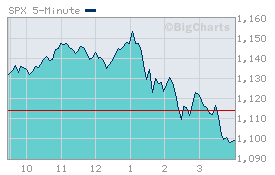
(The vote was at 1:30 pm Eastern time.)
Addendum on credibility: We were repeatedly told that various bad things would happen if the bailout bill was not passed by a certain date, usually tomorrow or next Monday. The banking system would collapse. ATMs would stop working. Firms would stop be able to meet payroll. None of those things ever happened. One of the promised bad things was the collapse of the Asian stock market which woke up a week ago on Monday, saw that no bill was yet passed and survived. The house turned down the bill later in the day; the Asian market survived again. Today...Monday October 6, after the bill passed...the headline is "Asian markets plunge on crisis fears."
[Posted at 10/03/2008 02:02 PM by David K. Levine on Against Monopoly  comments(0)] comments(0)] [Posted at 10/02/2008 08:59 AM by David K. Levine on Against Monopoly  comments(7)] comments(7)] We are going to pay for a $700 billion bailout by cutting taxes by $150 billion??
I have a new much cheaper bailout plan: let's take $100 billion, and give an equal share to every member of the House of Representatives who agrees to give half of it away tax-free. Those that have investment bankers on their backs can give it to them; those that want to help people who can't pay their mortgages can give it them. That should get all of them off our backs.
Alternatively, let's revert to the original Poulson plan with an additional clause that the personal taxes of all the economists that signed the letter opposing the bailout will be cut to zero. That should get us off their backs. [Posted at 10/01/2008 04:48 PM by David K. Levine on Against Monopoly  comments(1)] comments(1)] We have written an expositional article describing how we got into the current financial mess and what to do about it. Here is the beginning and end of the article:
Everyone knows that the United States faces a serious financial crisis and that the Administration is asking for an astoundingly large sum of money to fix the problem. Fewer may know what economists think about the crisis. Most academic economists - the economists who do not work for companies likely to benefit from the bailout, nor for the President - are opposed to this plan. This large group of experts has wide ranging political opinions, and includes democrats, republicans, and most likely some libertarians. So: why is there a crisis, what is this plan, and why are a large number of academic economists opposed to it?
...
The bottom line, in the immediate future, is this. The Federal Reserve Bank and its sister agencies such as the Federal Deposit Insurance Corporation (FDIC) already have strong tools against a cascading failure of the banking system. They has been using those tools, including advancing credit to banks through the discount window, insuring deposits, and selectively allowing institutions to fail. We have seen isolated bank failures. There will be more in the future. We have not seen good banks fail, nor have we seen cascading failures. We have been given no reason to think anything of the sort is imminent. It is sad to say that despite this the U.S. Government is in a state of panic. Supposedly knowledgeable government officials talk as if ATMs might stop working and firms will not be able to meet their payrolls. This is utter nonsense. To debunk the obvious: Washington Mutual failed Thursday night. Washington Mutual ATM cards continue to function as usual. Individual and corporate bank accounts are federally insured up to $100,000 per bank. The normal process of bank closure does not prevent bank customers from accessing their funds. As to payroll: We do not doubt that some firms of various sizes are going to fail to meet payroll and go bankrupt in the next weeks. It is likely that a few of them would have been able to survive if credit was more widely available at the moment. But most firms do not meet payroll by short-term borrowing. The fact that banks are reluctant to lend to each other does not have much impact on their ability to make short term loans to customers. And so on.
No objective reading of data we have access to indicates anything near as bad as the claims that are being made. It may be that eventually more intervention than the Federal Reserve and Treasury can do without Congressional action will be needed. However, this is not a natural calamity or a war where there will be large and irreparable harm if we do not act immediately. There is adequate time for the public, the Congress, the Treasury and Federal Reserve to think through the alternatives carefully, to monitor the situation with equal care, and if necessary intervene in markets in a way that makes sense.
Public officials, especially the Chairman of the Federal Reserve Board have an obligation to explain these facts and reassure people that they are not in danger of a catastrophic collapse. It is rather unfortunate, then, the opposite seems to be occurring. For example, on September 24 Ben Bernanke declared in front of Congress:
All told, real gross domestic product is likely to expand at a pace appreciably below its potential rate in the second half of this year and then to gradually pick up as financial markets return to more-normal functioning and the housing contraction runs its course. Given the extraordinary circumstances, greater-than-normal uncertainty surrounds any forecast of the pace of activity. In particular, the intensification of financial stress in recent weeks, which will make lenders still more cautious about extending credit to households and business, could prove a significant further drag on growth. The downside risks to the outlook thus remain a significant concern.
...
Over time, a number of factors should promote the return of our economy to higher levels of employment and sustainable growth with price stability, including the stimulus being provided by monetary policy, lower oil and commodity prices, increasing stability in the mortgage and housing markets, and the natural recuperative powers of our economy. However, stabilization of our financial system is an essential precondition for economic recovery. I urge the Congress to act quickly to address the grave threats to financial stability that we currently face. For its part, the Federal Open Market Committee will monitor economic and financial developments carefully and will act as needed to promote sustainable economic growth and price stability.
Roughly speaking he said "things are not too bad, but gradually getting worse, and you better act quickly to give us $700 billion to fix it." The conclusion does not seem to follow. It is not surprising that people imagine that there is far more catastrophic information that he is not telling us. If the Federal Reserve Bank and Treasury in fact have information that things are worse than Bernanke reported they should tell us what it is. Otherwise they should stand up and make it clear that doomsday is not around the corner. [Posted at 09/30/2008 04:26 PM by Michele Boldrin and David K. Levine on Against Monopoly  comments(6)] comments(6)] How do you engineer a perfect financial storm? We just witnessed how.
First: the Fed Chairman, the Secretary of the Treasury and the President (BPB, from now on) all go on TV stating that a great disgrace will fall upon the country should Congress not do X. X is, strangely, something that, prima facie, looks very advantageous for people and firms that one would not err too much by characterizing as "close" to BPB.
Second: neither BPB nor their associates, nor anyone supporting X (in particular, not the "friends" that should receive advantages from it) explain what the danger is, how it works, what will cause what and how did we get to this. They insist on the matter being super urgent and dramatic, no discussion please, there is no time. Just to make things look even more dramatic, the future .5(President) (well, make that .3(President)) suggests to suspend the presidential campaign in light of the national emergency ...
Third: during the weekend the anxiety increases amid tense and obscure bargaining among the parties. In the meanwhile, various proposals Y, Z, K, ... (all addressing the same issues as X but less favorable to the "friends") are dismissed outright. It is, BPB keep repeating, either X or nothing. Trust us, we know better.
Fourth: well, we just witnessed it today. In the midst of the panic caused by the refusal of Congress to just "buy X as is", the friends (and possibly also the foes, at this point) of BPB run for cover and the markets collapse (silver lining: price of oil also did). Now the scare is complete, everybody is in panic, and no one understand what is going on and why ... The opening of Asian markets a few hours from now is awaited in great fear. The sense of historic drama is palpable.
Prediction: the plan will be forced down the throat of Congress between tonight and tomorrow. Now something really needs to be done, hence we will do X.
The perfect storm, once again. These guys are skillful, that much I admit. [Posted at 09/29/2008 02:57 PM by Michele Boldrin on Against Monopoly  comments(3)] comments(3)] current posts | more recent posts | earlier posts
|


